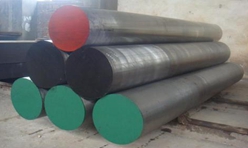1.2550 AISI S1 60WCrV8 Cold Work Steel
1 1.2550 Introduction:
1.2550 Cold work steel with very good toughness, dimensionally stable, impact resistant, high hardening capacity. Similar with AISI S1.
We can provide more services:
1、Hardening and tempering
2、Vacuum heat treatment
3、Polished bright surface
4、Milling bright surface
5、CNC machine
6、Deep drilling
7、Cut into small pieces
8、Make it closer to the mold
Welcome to inquiry price from drawing
Cutting:
Precision cutting to standard dimensions
Custom cutting according to client specifications
Surface Grinding/Polishing:
Thickness tolerance: -0 to +0.1mm
Flatness: 0.01/100mm
Surface roughness: Ra ≤1.6 or Rz ≤6.3
2 1.2550 Applications:
Typical applications include mandrel bars for drawing steel tubes, swaging, also punching, piercing, trimming dies and shear blades, forming and gripper dies.
3 Quality Standard:
BS-EN-ISO-4957-2000 Tool Steel
4 All Grades Comparison:
| ASTM | Material No. | EN |
|---|---|---|
| S1 | 1.2550 | 60WCrV8 |
5 1.2550 Chemical Composition(%)
| Steel Grade | C | Si | Mn | P | S | Cr | Mo | V | W |
|---|---|---|---|---|---|---|---|---|---|
| 1.2550 | 0.55-0.65 | 0.70-1.00 | 0.15-0.45 | 0.030 max | 0.030 max | 0.90-1.20 | / | 0.10-0.20 | 1.70-2.00 |
6 HEAT TREATMENT:
- FORGING:Heat the steel carefully to a temperature of 1000-1050°C and forge with light rapid blows. Reheat when temperature falls below 900°C if further work remains to be done. After forging, cool slowly, ideally in a furnace.
- ANNEALING: Heat the component slowly and uniformly to 800-810°C. Soak thoroughly for two to three hours and cool slowly in the furnace.
- STRESS RELIEVING: If the machining operations have been severe, we recommend stabilising just before the tool components are finish machined to relieve machining strains. Heat slowly to a temparature of 700°C, allow to cool in air.
- HARDENING:Preheat at 650°C followed by rapid increase of temperature to 900-950°C. Quench in oil. Tempering of this grade is always recommended after hardening.
- TEMPERING: Heat slowly to the required tempering temperature, soak thoroughly for two hours per 25mm section and allow to cool in air. For hot work applications, a minimum tempering temperature of 550°C should be used.
7 Mill′s test certificate:
EN 10204/3.1 with all relevant data reg. chem. composition, mech. properties and results of testing.

